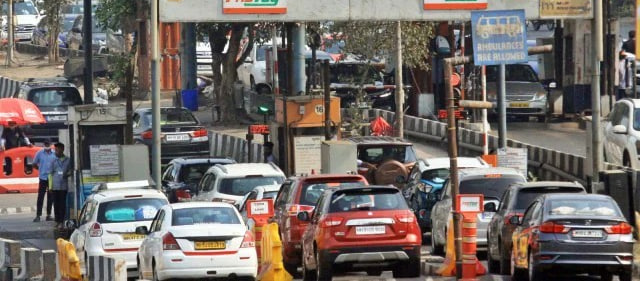



The Indian government has introduced a FASTag Annual Pass for Rs 3,000, offering private cars, jeeps, and vans hassle-free travel on National Highways. Effective August 15, the non-transferable pass is valid for one year or 200 trips, whichever comes first, providing a cost-effective option for frequent travelers.

Copyright infringement not intended
Picture Courtesy: INDIAN EXPRESS
Government announced a new FASTag Annual Pass scheme aimed at making highway travel more convenient and affordable for citizens.
It is a new facility announced by the Union Minister of Road Transport and Highways to provide hassle-free travel on national highways and expressways.
The scheme is set to become effective on August 15, 2025.
It allows a private, non-commercial vehicle like a car, jeep, or van to pass through toll plazas on National Highways (NH) and National Expressways (NE) without paying a fee for each trip.
The pass costs a flat fee of ₹3,000 for the year 2025-26. It is valid for one year from the date of activation or for 200 trips, whichever comes first.
Activation Process => Users can activate the pass through the Rajmargyatra mobile application or the official National Highways Authority of India (NHAI) website.
Existing FASTag Users => There is no need to purchase a new FASTag. The annual pass can be activated on an existing, valid FASTag that is properly affixed to the vehicle's windshield and not blacklisted.
Trip Calculation => For point-based toll plazas, each crossing counts as a single trip. A round trip will be counted as two trips. For closed tolling systems, one pair of entry and exit points is considered a single trip.
Renewal => Once the 200-trip limit is reached or the one-year validity expires, the pass automatically reverts to a regular FASTag. Users can then repurchase the annual pass.
The Annual Pass is valid only at fee plazas on National Highways and National Expressways managed by the central government.
It is not valid on expressways or state highways managed by state governments or other local bodies. On these routes, the FASTag will function normally, and the applicable toll charges will be deducted.
|
The government estimates that users can save at least ₹7,000 per pass, with the average cost per toll crossing dropping to around ₹15. The Ministry of Road Transport and Highways (MoRTH) has indicated that the ₹3,000 fee may be revised annually, with changes taking effect from April 1st of each year. |
FASTag is an electronic toll collection (ETC) system, designed to make toll payments directly from a prepaid or savings account linked to it.
The system is operated by the Indian Highways Management Company Limited (IHMCL), a company incorporated by the National Highways Authority of India (NHAI), and the National Payments Corporation of India (NPCI), which oversees all retail payments.
FASTag works using Radio Frequency Identification (RFID) technology. An RFID-enabled sticker is affixed to the vehicle's windscreen, and a reader at the toll plaza scans this tag to deduct the toll amount electronically.
It was launched as a pilot project in 2014. Since 2021, FASTag has been made mandatory for all private and commercial vehicles.
Vehicles not fitted with a valid FASTag are required to pay double the toll fee in cash at plazas.
Source:
|
PRACTICE QUESTION Q. With reference to the FASTag Annual Pass, which of the following statements is incorrect? A) The pass is an initiative launched by the Ministry of Road Transport and Highways. B) A user must have a registered mobile number to receive SMS alerts related to the pass. C) The scheme is mandatory for all private car owners to standardize toll collection. D) The pass automatically reverts to a regular FASTag after its validity expires. Answer: C Explanation: The Ministry of Road Transport and Highways introduced the FASTag Annual Pass. The Annual Pass is not mandatory. It is an optional facility for frequent travelers. The existing FASTag ecosystem continues to operate for those who do not opt for the pass. |






© 2026 iasgyan. All right reserved